Col. Sudhir Farm
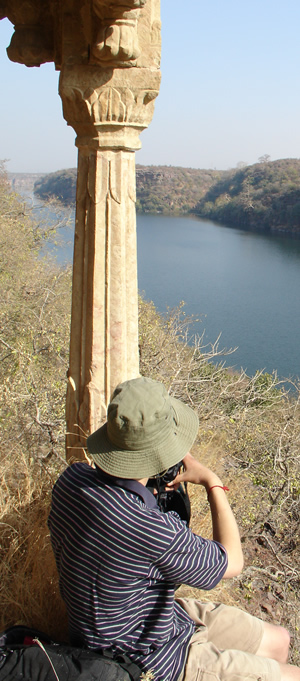
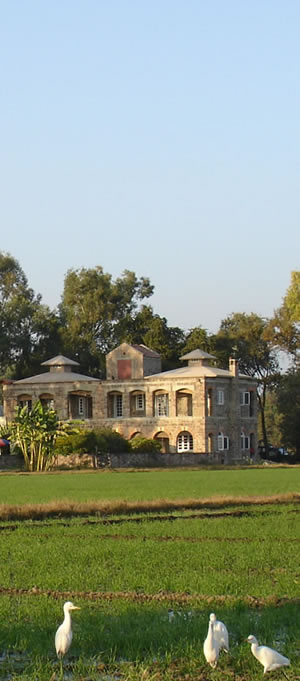
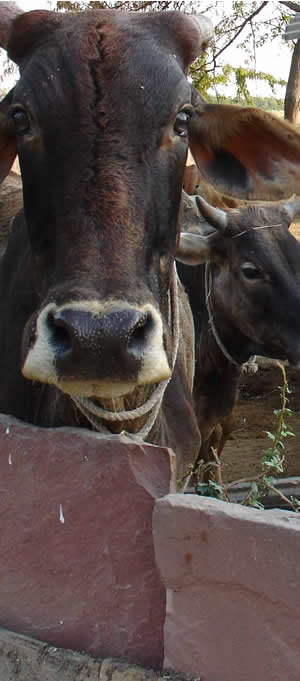
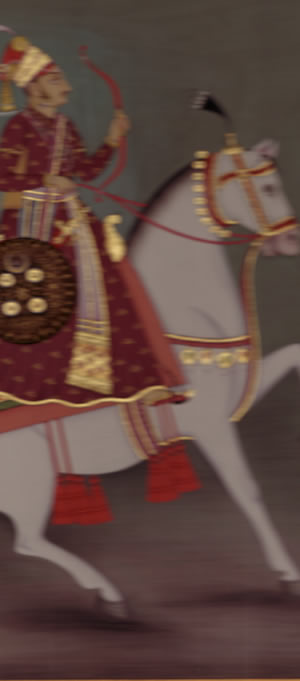
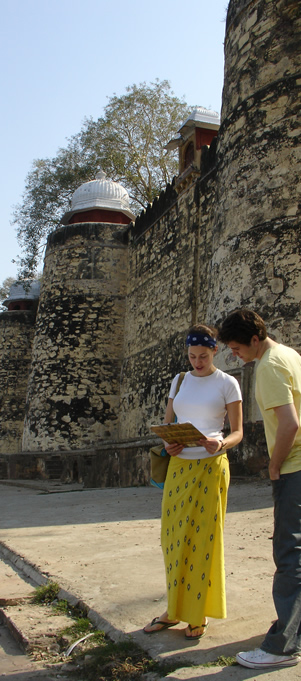
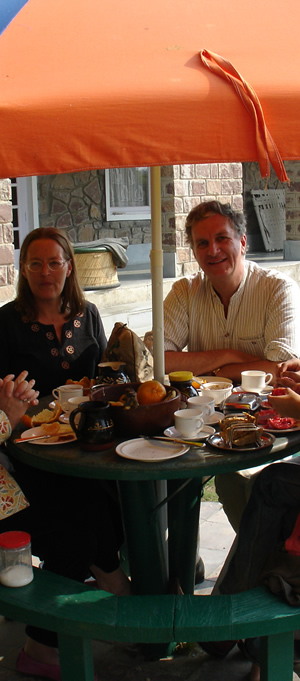
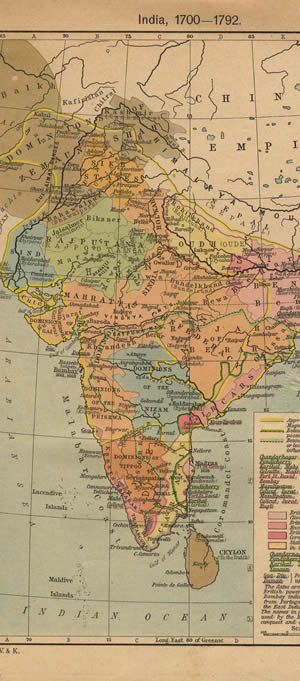
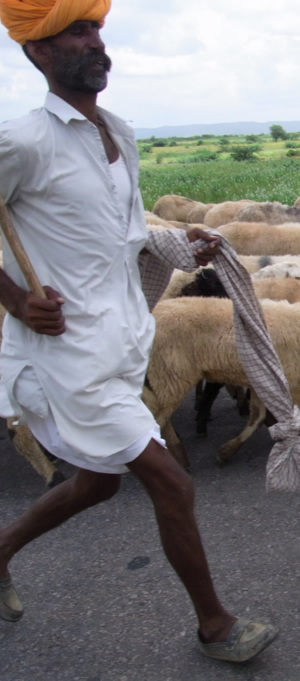
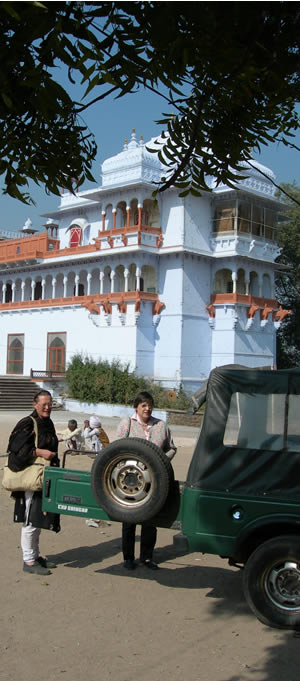
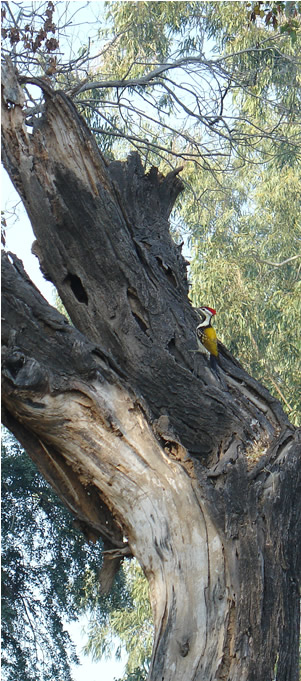
Snippets from the Visitors' Book
The Kota tonga trail was a real highlight - a bit like a 19th Century treasure hunt. It’s full of little nuggets of unusual information and fascinating glimpses into the unsolved mysteries of Kota.
Harriet and Will, London. UK
The memorial to Major Burton and his sons was much more moving than the Taj Mahal or the lake at Udaipur, marvellous as they are.
Henry Vane, Cumbria, UK
...the most comfortable bed I’ve slept in for 2 months....
Charlotte Adam, Winchester UK
Two days out of the noise and the people in a beautiful place. We felt totally
at home
- To be recommended to every person who wishes to experience the Indian country life. We also liked the way the food was prepared...
Patrick & Marie-Christine Lemaigre, Nil-St Vincent, Belgium
We’re only here for the porridge and home made bread! Thank you for a most wonderful time the memories of which we shall carry always. You have given us a wonderful & fascinating introduction to India.
Sue Turner, Lancashire, UK
So ...Rajasthan is not all desert! Thank you for sharing everything with us....
The Read family, London, UK
What a wonderful time we’ve had at the school in the village, at the weavers’, on the river, atop a tonga! Thank you for all your help and contacts throughout India
Anne Gerbner, Philadelphia, USA
It was a wonderful stay and thank you for giving us such a positive look at India and Rajasthan.
Salma Goldstein, New Jersey, USA
- There once was a lady of Kota
- Who took visitors out in her motor
- With the roads and the ruts
- It took quite some guts
- To go out with the lady of Kota.
- But once back at home on the farm
- The world quite descended to calm
- With the plants and the birds
- And fox terriers in herds
- There was balm in the calm on the farm.
Sue Millar, London, UK
After travelling around Rajasthan for two weeks, reaching a real house with books on the shelves, photos on the walls and four happy dogs was simply wonderful.
Camille Savinien, Paris, France
This isn’t tourism. I know of nowhere else where you can experience the real India as well as on your traditional working Rajasthani farm.
Sam Milward, Wellington, New Zealand
Thank you so very much for such a wonderful stay - what a fantastic introduction to India. I don’t think we’ll find such tranquillity elsewhere.
Lizzie Fortune, Hampshire. UK
Fabulous - I’ve been spoilt. It’s hard to leave and face the real world.
Elisabeth Simson, Isle of Wight, UK
After travelling around Rajasthan for two weeks, reaching a real house with books on the shelves, photos on the walls and four happy dogs was simply wonderful.
Camille Savinien, Paris, France
This isn’t tourism. I know of nowhere else where you can experience the real India as well as on your traditional working Rajasthani farm.
Sam Milward, Wellington, New Zealand
Thank you so very much for such a wonderful stay - what a fantastic introduction to India. I don’t think we’ll find such tranquillity elsewhere.
Lizzie Fortune, Hampshire. UK
Our visit at the farm was truly wonderful, off the beaten track it is a slice of India a visitor does not normally experience. Victoria is very knowledgeable about Indian culture and the people - an added perspective for us. The food here was very delicious: organically home grown ingredients, vegetables, fruits, grains prepared simply homestyle. A nice change from curries. Enjoyed the early morning boat ride and walk to the weavers. Many thanks.
Johanna Janssens, Washington, USA
I loved staying with you and the dogs and playing with the toys.
Jonas aged 8, Switzerland
A very welcome break from the crazy world of India – wonderful house, food and hospitality. Thank you so much.
Katie Buxton, Bath, UK
I loved seeing the crocodiles, and I learned a lot about deticking the puppies. Coming to the farm was a great experience.
Stella Bartholet, Washington, USA
A wonderful eye opening visit in every sense. We will be back! Thank you!
Christopher & Joanna Hobson, Northamptonshire, UK
A blissfully peaceful stay. We enjoyed everything – even the power cut. Thank you for lovely food, good company and very interesting trips.
Vicky Stark, London, UK
Exactly what we hoped for and more, bits of India off the tourist track, life as it actually is in villages, teeming life and livestock and the magic of the river.
Sir Hilary Miller, Worcester, UK
Thank you for the introduction to miniature painters, wall paintings, stories, great food, good company, walk through the fields. I loved the paintings in the City Palace and go back full of inspiration and memories.
Nan Mulder, Edinburgh, UK

On the Farm - 2014 Archive
On the Farm - December ’14
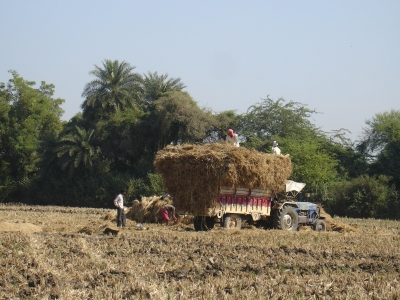 The month began with lifting the rice straw or pral and stacking it near the cowshed. Then the field had to be ploughed and watered. Once the soil had dried enough, it was ploughed twice more and sown with wheat on 27th December, the latest ever sowing on our records.
The month began with lifting the rice straw or pral and stacking it near the cowshed. Then the field had to be ploughed and watered. Once the soil had dried enough, it was ploughed twice more and sown with wheat on 27th December, the latest ever sowing on our records.
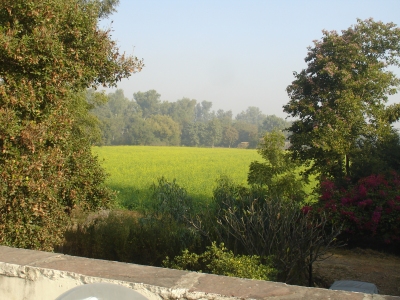 The mustard had had a month’s growth and needed watering. It immediately began to flower, transforming the farm into a yellow patchwork quilt. This was the view from the roof by the end of December.
The mustard had had a month’s growth and needed watering. It immediately began to flower, transforming the farm into a yellow patchwork quilt. This was the view from the roof by the end of December.
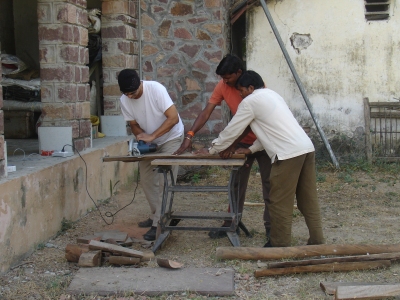 We knew that cold weather was coming and cut logs in preparation. 27th December was the coldest December night in ten years at 4oC; that was the temperature recorded by the met office some miles away. On our next door farm a man sleeping out in the open found his blanket coated with ice in the morning, so it must have been colder in our part of the world. But we had a beautiful sunny Christmas. By the 31st it had become misty and cold and it rained for two hours on 31st rather dampening new year celebrations.
We knew that cold weather was coming and cut logs in preparation. 27th December was the coldest December night in ten years at 4oC; that was the temperature recorded by the met office some miles away. On our next door farm a man sleeping out in the open found his blanket coated with ice in the morning, so it must have been colder in our part of the world. But we had a beautiful sunny Christmas. By the 31st it had become misty and cold and it rained for two hours on 31st rather dampening new year celebrations.
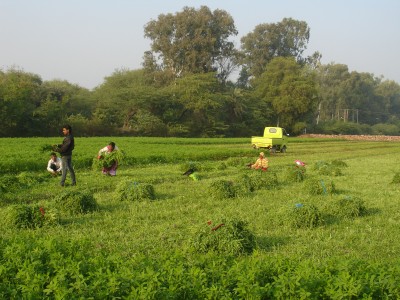 Protecting the young wheat from the pigs was a major headache. On 7th December, all three dogs cornered a pig and demanded help. In the process all three got non-life threatening wounds which took time to heal. They slept inside during the cold weather but were still aware of pig and nilgai activity outside.
Protecting the young wheat from the pigs was a major headache. On 7th December, all three dogs cornered a pig and demanded help. In the process all three got non-life threatening wounds which took time to heal. They slept inside during the cold weather but were still aware of pig and nilgai activity outside.
The pigs were attracted by a large field of bersim which we no longer own. Cattle fodder was being grown on contract. From 15th December women came every day to cut a day’s supply and to await the arrival of their mustard coloured pick-up truck. The green fodder is sold to people at a roundabout in South Kota, we are told, where people seem to buy it in bundles to feed to cows for spiritual upliftment.
Happy New Year!
On the Farm - November ’14
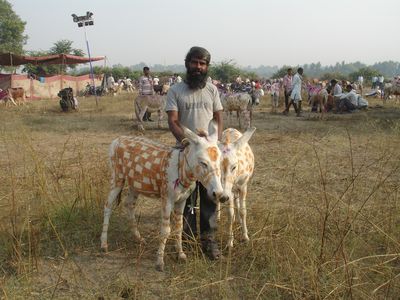 November was also warmer than usual which seems to have been a global trend. Apparently, if one believes the pundits, 2014 has been the warmest year on record. A shorter growing period will lead to lower yields and less profit.
November was also warmer than usual which seems to have been a global trend. Apparently, if one believes the pundits, 2014 has been the warmest year on record. A shorter growing period will lead to lower yields and less profit.
Profits are definitely down for donkey owners. There has been a Donkey Fair at Umedganj near here since time immemorial. We look forward to the clatter of donkey hooves as Karthik Poornima (full moon) approaches. This is the same full moon that draws camel owners to Pushkar. Many donkeys have walked for a week to get here. The owner has decorated his donkeys to attract buyers, but as the full moon night passed the clatter of hooves came back down the road; reportedly no buyers had come to the fair.
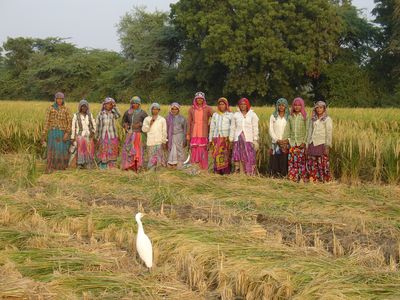 Rice growers’ profits are also down. After last year’s exceptionally high prices of Rs.3600 for 100 kgs. we got Rs.1900 for the same quality this year. Costs, of course, have risen. It is said that the warehouses are still full from last year.
Rice growers’ profits are also down. After last year’s exceptionally high prices of Rs.3600 for 100 kgs. we got Rs.1900 for the same quality this year. Costs, of course, have risen. It is said that the warehouses are still full from last year.
We had two teams of women harvesting the rice. This team being ‘inspected’ by a cattle egret started on 7th November and finished on 30th November.
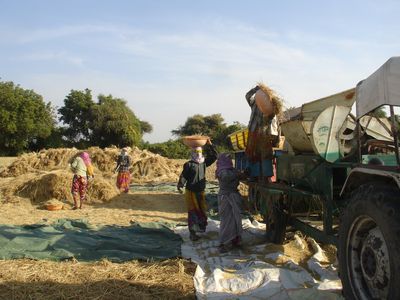 They had to hand-cut, tie the bundles, stack them, bash them over oil drums, and then thresh the grain as seen here.
They had to hand-cut, tie the bundles, stack them, bash them over oil drums, and then thresh the grain as seen here.
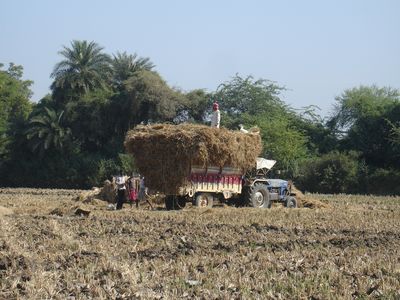 The rice staw was loaded-up and moved to the cowshed in trolley loads like this by a team of 4 labourers.
The rice staw was loaded-up and moved to the cowshed in trolley loads like this by a team of 4 labourers.
The mustard has germinated well and by the end of November was ready for its first watering. Bersim, oats and heritage wheat (C306) are also doing well and are attracting a hungry nilgai or blue bull at night.
On the Farm - October ’14
October was warmer than usual and we had to wait for the daytime temperatures to drop below 34oC to plant mustard. Farmers who planted after the rains suffered from insect infestations and many felt forced to spray.
We were watering the fields ready for the mustard and cow fodder of Egyptian bersim and jo which is oats.
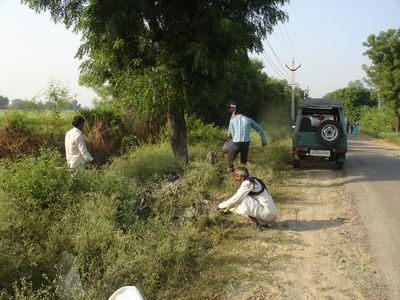 On 2nd October, which is always celebrated as Gandhi’s birthday, a new campaign was launched by the Prime Minister called Swach Bharat Yojna or Clean India Programme. All citizens were encouraged to go out and clean-up a street or an area. We took our two farmhands at 8.00am and cleaned-up the road. Here we have asked a passerby to lend his matches to light a small fire as we wanted to burn a trolley load of rubbish that had been fly-tipped. We picked up all the plastic bags along the road and tried to explain to passersby what we were doing and why.
On 2nd October, which is always celebrated as Gandhi’s birthday, a new campaign was launched by the Prime Minister called Swach Bharat Yojna or Clean India Programme. All citizens were encouraged to go out and clean-up a street or an area. We took our two farmhands at 8.00am and cleaned-up the road. Here we have asked a passerby to lend his matches to light a small fire as we wanted to burn a trolley load of rubbish that had been fly-tipped. We picked up all the plastic bags along the road and tried to explain to passersby what we were doing and why.
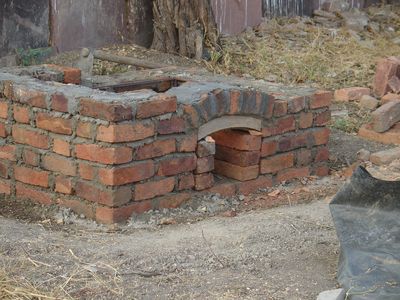 Our men burn their rubbish in an old metal drum but the drums only last 2 years and so we bought bricks for them to build a brick incinerator similar to the one we have for our house rubbish. Burning rubbish is frowned upon in urban areas but it works well in rural ones.
Our men burn their rubbish in an old metal drum but the drums only last 2 years and so we bought bricks for them to build a brick incinerator similar to the one we have for our house rubbish. Burning rubbish is frowned upon in urban areas but it works well in rural ones.
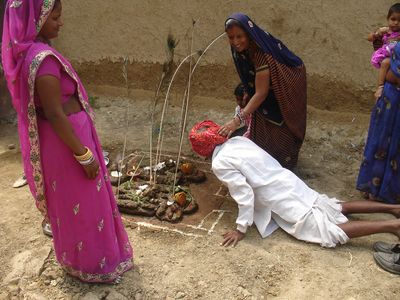 October is Divali month and the ground and houses are re-covered in leepna and decorated. The cows were washed and had their horns painted with a terracotta powder mixed with linseed oil. The Govardhan Puja was performed on the second day of Divali to honour the cows and bring prosperity. Part of the tradition involves picking up puris using your mouth and no hands as seen here. Needless to say, we don’t attempt it. The weather was unusually cloudy this year because of typhoon Nilofer in the Arabian Sea. We were on the extreme edge but got no rain.
October is Divali month and the ground and houses are re-covered in leepna and decorated. The cows were washed and had their horns painted with a terracotta powder mixed with linseed oil. The Govardhan Puja was performed on the second day of Divali to honour the cows and bring prosperity. Part of the tradition involves picking up puris using your mouth and no hands as seen here. Needless to say, we don’t attempt it. The weather was unusually cloudy this year because of typhoon Nilofer in the Arabian Sea. We were on the extreme edge but got no rain.
We lost our second oldest cow this month as 17-year old Velvet died of old age. She was out grazing during the day and died in the night of 8th October. She is survived by her 21-year old mother Mun-Mun, who is being milked everyday.
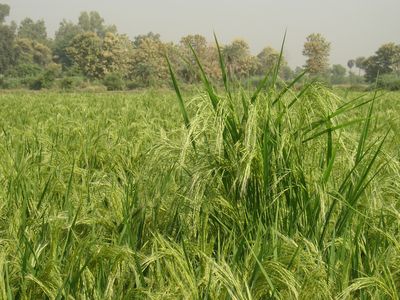 Our rice fields have been watered all month and started to ripen by the end of October. The organic rice field has many rogue rice plants which are a different variety. These will be hand cut separately. Upto 25 wild pigs have been coming to our rice fields every night and can only be frightened away, so we think, with firework ‘bombs.’ Nearby farmland has been sold for housing and colonies are coming up. Boundary walls are blocking access and increasingly our farm is one of the few available to them. The pressures of population increase and urbanisation are evident everwhere. We went to a wedding reception given by a Master Weaver's family in Kaithoon. There were 6000-7000 guests, who came and went during the evening.
Our rice fields have been watered all month and started to ripen by the end of October. The organic rice field has many rogue rice plants which are a different variety. These will be hand cut separately. Upto 25 wild pigs have been coming to our rice fields every night and can only be frightened away, so we think, with firework ‘bombs.’ Nearby farmland has been sold for housing and colonies are coming up. Boundary walls are blocking access and increasingly our farm is one of the few available to them. The pressures of population increase and urbanisation are evident everwhere. We went to a wedding reception given by a Master Weaver's family in Kaithoon. There were 6000-7000 guests, who came and went during the evening.
On the Farm - September ’14
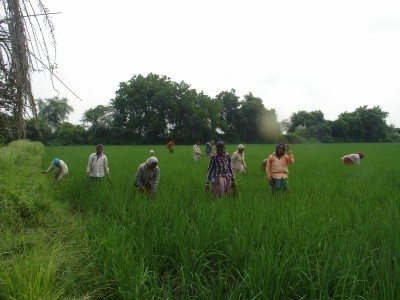 The monsoon rain finished on 11th September this year and the farm began to dry out.
The monsoon rain finished on 11th September this year and the farm began to dry out.
The women weeded the rice for a second time. As the rice was taller they couldn’t squat down and had to bend and keep moving. By keeping the field under water the normal meadow grass doesn’t grow, in theory, but not in practice.
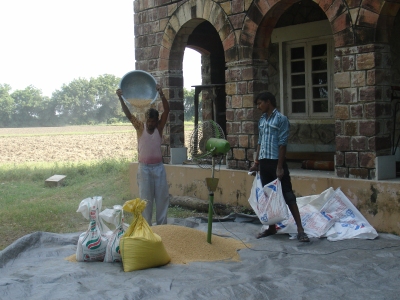 Our old fashioned low gluten non-hybrid wheat which we grow for home consumption developed little insects during the monsoon. The wheat was spread in the sun for several days to force them to evacuate. It was then winnowed by being blown with a large fan. The wheat to be sown has to be sieved and graded (but must not be washed!). Only non-hybrid seeds can be saved from year to year and sown. The quality of hybrid seeds degenerates in the second generation and genetically modified seeds are known as ‘terminator seeds’ as they can’t be saved and sown and you have to buy from the company each year.
Our old fashioned low gluten non-hybrid wheat which we grow for home consumption developed little insects during the monsoon. The wheat was spread in the sun for several days to force them to evacuate. It was then winnowed by being blown with a large fan. The wheat to be sown has to be sieved and graded (but must not be washed!). Only non-hybrid seeds can be saved from year to year and sown. The quality of hybrid seeds degenerates in the second generation and genetically modified seeds are known as ‘terminator seeds’ as they can’t be saved and sown and you have to buy from the company each year.
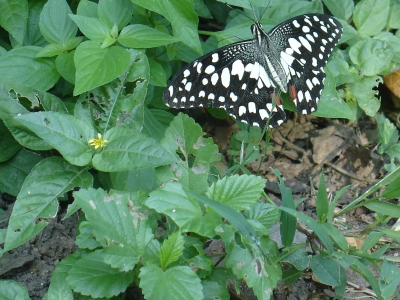 During September we made a conscious effort to notice our numerous butterflies and to photograph and identify them. We have never done this before. Since butterflies only have Latin and English names in India, no one else locally can identify them either. We were preparing for a photo exhibition to be held in Wildlife Week at the beginning of October; it was called ‘Birds and Insects of the Chambal.’ We wanted to create awareness about our beneficial insects and pollinators like bees and butterflies.
During September we made a conscious effort to notice our numerous butterflies and to photograph and identify them. We have never done this before. Since butterflies only have Latin and English names in India, no one else locally can identify them either. We were preparing for a photo exhibition to be held in Wildlife Week at the beginning of October; it was called ‘Birds and Insects of the Chambal.’ We wanted to create awareness about our beneficial insects and pollinators like bees and butterflies.
Here is a lime butterfly. These swallowtail butterflies lay their eggs on the lemon trees that we have in our front garden and around the house.
In August I had mentioned a scheme whereby poor women received two thousand rupees a month directly into a bank account. This appears to be untrue. If they have a bank account they can borrow Rs. 2000 which has to be paid back. Not quite the same thing.
On the Farm - August ’14
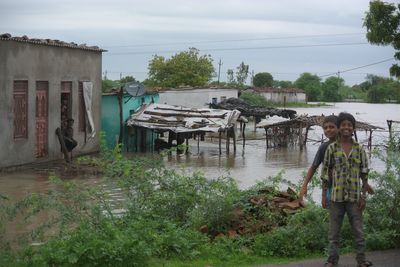 After no rain in June and heavy rain in July, further torrential rain in August led to the worst flooding for ten years. The road to Dhakerkheri was under water and low lying houses flooded to roof height. The sweepers’ families live in a collection of shacks some distance from the lowest point. Here you can see them taking refuge in their one ‘pukka’ building. They had been wary about stepping out to get their drinking water as crocodiles had been seen.
After no rain in June and heavy rain in July, further torrential rain in August led to the worst flooding for ten years. The road to Dhakerkheri was under water and low lying houses flooded to roof height. The sweepers’ families live in a collection of shacks some distance from the lowest point. Here you can see them taking refuge in their one ‘pukka’ building. They had been wary about stepping out to get their drinking water as crocodiles had been seen.
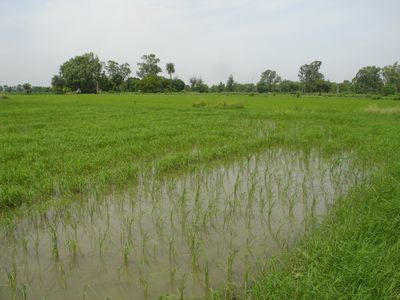 In such conditions only rice can thrive. This field had never been planted with rice before. The rice plants are spaced in the foreground. The bunched areas are thick with natural meadow grass which has not been deterred by being under water and has to be pulled out manually. Most farmers use chemical spray and then labour to pull out the dead weeds.
In such conditions only rice can thrive. This field had never been planted with rice before. The rice plants are spaced in the foreground. The bunched areas are thick with natural meadow grass which has not been deterred by being under water and has to be pulled out manually. Most farmers use chemical spray and then labour to pull out the dead weeds.
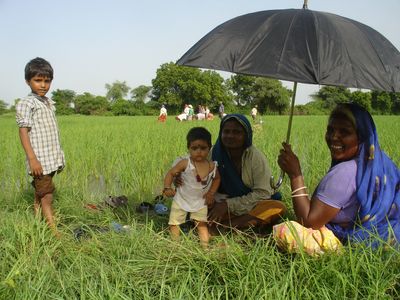 The rice-weeding team took four days to pull up all the grass in this 10 bigha field. The rain had stopped on 17th August and the rest of the month was hot and humid. They came at 10.00am and worked till 6.00pm with an hour off for lunch. They earned Rs.150 per day i.e. GBP 1.50. It is for women like these that the Chief Minister of Rajasthan has launched a women empowerment scheme. Each woman is to have a bank account into which will be paid Rs.2000 a month and any scholarships or other grants and loans. Too many families suffer from the men ‘drinking’ any income.
The rice-weeding team took four days to pull up all the grass in this 10 bigha field. The rain had stopped on 17th August and the rest of the month was hot and humid. They came at 10.00am and worked till 6.00pm with an hour off for lunch. They earned Rs.150 per day i.e. GBP 1.50. It is for women like these that the Chief Minister of Rajasthan has launched a women empowerment scheme. Each woman is to have a bank account into which will be paid Rs.2000 a month and any scholarships or other grants and loans. Too many families suffer from the men ‘drinking’ any income.
Ritu’s mother Sita was working with the team. Ritu, now nearly one, has been brought to her for a little ‘snack.’ There are advantages to rural life.
The non-rice fields were also under water and finally dried out enough to be ploughed after 23rd August. By the end of the month, the farm was a patchwork of lush green paddy fields and freshly tilled brown soil.
On the Farm - July ’14
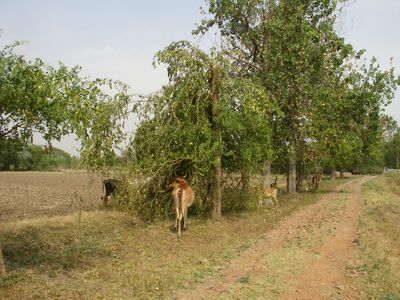 The monsoon rain arrived very late this year with no pre-monsoon showers and predictions of a weak monsoon attributed to the El Nino effect although no one understands that effect.
The monsoon rain arrived very late this year with no pre-monsoon showers and predictions of a weak monsoon attributed to the El Nino effect although no one understands that effect.
The top of this sheesham tree blew down in a violent dust storm which was followed by rain on 13th July. The cows enjoyed eating the leaves. Notice that the field behind is ploughed and bare.
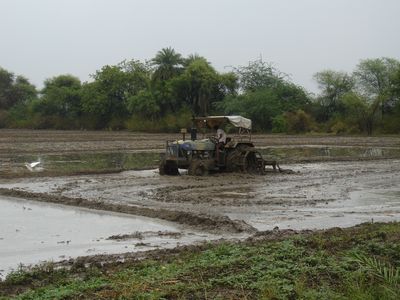 With the first rains we started to prepare for rice planting by flooding each section in the field in turn and then levelling the mud using this tractor with special wheels and a wooden levelling bar behind. By 17th July the land had become waterlogged from the rain. A team of 10 Biharis planted each section as it was readied, finishing at the end of July. A baby crocodile was spotted swimming in this field.
With the first rains we started to prepare for rice planting by flooding each section in the field in turn and then levelling the mud using this tractor with special wheels and a wooden levelling bar behind. By 17th July the land had become waterlogged from the rain. A team of 10 Biharis planted each section as it was readied, finishing at the end of July. A baby crocodile was spotted swimming in this field.
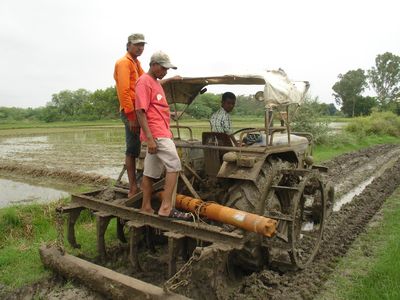 Our house inverter had burnt out on 12th July with the erratic power supply in the heat. On 24th July the main submersible pump burnt out too. It was 12 years old and had burnt out at least twice before. We bought a new pump based on German techonology called Pluga with a 7.5 hp rating for Rs.31000, and Ghasi was able to fit it within 24 hours, so the watering of the paddy, which goes on day and night, could continue.
Our house inverter had burnt out on 12th July with the erratic power supply in the heat. On 24th July the main submersible pump burnt out too. It was 12 years old and had burnt out at least twice before. We bought a new pump based on German techonology called Pluga with a 7.5 hp rating for Rs.31000, and Ghasi was able to fit it within 24 hours, so the watering of the paddy, which goes on day and night, could continue.
The old pump was taken away to be mended and will serve as a backup. You can see what a muddy mess the tractor makes of the track but within a few days the mud has grassed over.
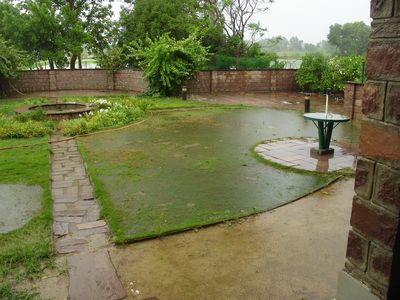 On 28th July we had about 20 cms. of rain in 12 hours which caused the road to flood for a few hours making it impassable. Within two weeks the whole farm was transformed into an area of lakes and grassy meadows with rice paddies. Compare with July's first photo!
On 28th July we had about 20 cms. of rain in 12 hours which caused the road to flood for a few hours making it impassable. Within two weeks the whole farm was transformed into an area of lakes and grassy meadows with rice paddies. Compare with July's first photo!
On the Farm - June ’14
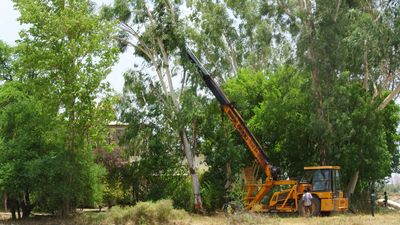 High winds and fallen trees caused havoc in June with the electricity supply. We hired a crane on the 13th to take down an eucalyptus tree near the house as it was leaning dangerously.
High winds and fallen trees caused havoc in June with the electricity supply. We hired a crane on the 13th to take down an eucalyptus tree near the house as it was leaning dangerously.
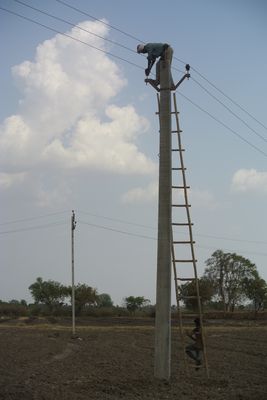 The government erected three new cement poles on our farm to raise the height of the electricity wires and to lessen the strain on existing poles. No cherry pickers here and the day time temperatures shooting upto 47oC.
The government erected three new cement poles on our farm to raise the height of the electricity wires and to lessen the strain on existing poles. No cherry pickers here and the day time temperatures shooting upto 47oC.
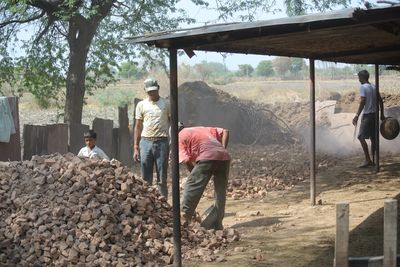 Here we are preparing for the monsoon by giving the cows something hard to stand on. It should be beaten down under their hooves to a flat surface when the rain comes.
Here we are preparing for the monsoon by giving the cows something hard to stand on. It should be beaten down under their hooves to a flat surface when the rain comes.
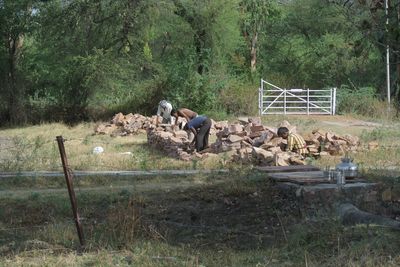 On the last day of June a team of 4 builders spent a day building a dry stone wall to mark the boundary of the field we have sold. They worked through the hot day, drinking lots of water but with uncovered heads. No rain yet so the temperatures are above 40oC.
On the last day of June a team of 4 builders spent a day building a dry stone wall to mark the boundary of the field we have sold. They worked through the hot day, drinking lots of water but with uncovered heads. No rain yet so the temperatures are above 40oC.
On the Farm - May ’14
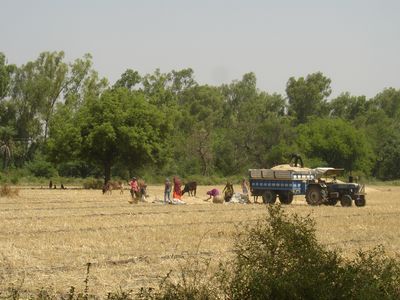 May is a hot dry post-harvest month when the labour takes holidays and general tidying work is done. The bhoussa or wheat chaff had to be removed from the fields and stored for cattle fodder. A team of Bhils were employed for a day and they loaded this trolley 10 times from 7.45 am to 7.30 p.m. You can see their children playing under the neem tree.
May is a hot dry post-harvest month when the labour takes holidays and general tidying work is done. The bhoussa or wheat chaff had to be removed from the fields and stored for cattle fodder. A team of Bhils were employed for a day and they loaded this trolley 10 times from 7.45 am to 7.30 p.m. You can see their children playing under the neem tree.
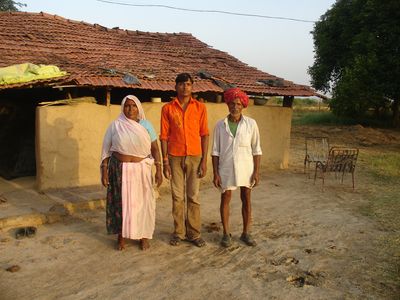 A new family joined us on 11th May. The traditionally attired father works on the next farm. Their youngest son, Vinod, has no birth certificate and has never been to school. He is working with us and probably saving his earnings for his marriage and has the same aspirations as other young men in India. We have given him a mobile phone so we can communicate with him.
A new family joined us on 11th May. The traditionally attired father works on the next farm. Their youngest son, Vinod, has no birth certificate and has never been to school. He is working with us and probably saving his earnings for his marriage and has the same aspirations as other young men in India. We have given him a mobile phone so we can communicate with him.
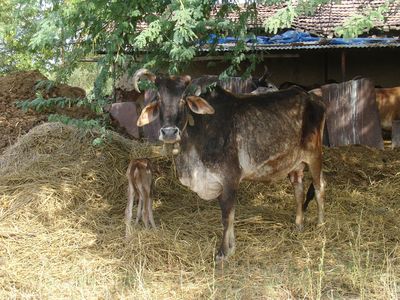 On 16th May the BJP under Narendra Modi won a landslide victory in the Indian national general elections. Four days later Mun-Mun gave birth to her 13th calf which although female is called Modi. Mun-Mun is 21 and could be the oldest bovine mother in the world.
On 16th May the BJP under Narendra Modi won a landslide victory in the Indian national general elections. Four days later Mun-Mun gave birth to her 13th calf which although female is called Modi. Mun-Mun is 21 and could be the oldest bovine mother in the world.
On the Farm - April ’14
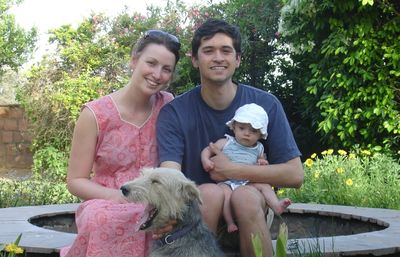 The highlight in April for us personally was the visit of our son Anand, our daughter-in-law Felicity, and our granddaughter Sophie - shown here enjoying the garden. Tigger is not impressed.
The highlight in April for us personally was the visit of our son Anand, our daughter-in-law Felicity, and our granddaughter Sophie - shown here enjoying the garden. Tigger is not impressed.
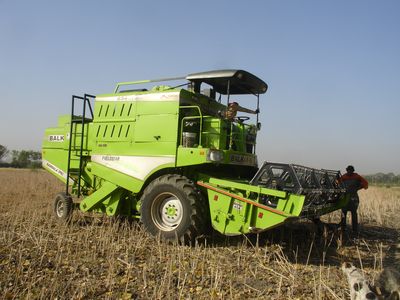 The main farming activity was the wheat harvest. Half was done by this combine in the photograph on 12th April and the rest was cut by hand starting on 14th April. The same team of ten women who had cut the mustard worked for several days in temperatures of over 40oC. There was a heavy thunder shower on 18th April when they had started threshing in the relative cool of the night so the work had to be abandoned and finally resumed on 23rd after the piled-up wheat had dried out.
The main farming activity was the wheat harvest. Half was done by this combine in the photograph on 12th April and the rest was cut by hand starting on 14th April. The same team of ten women who had cut the mustard worked for several days in temperatures of over 40oC. There was a heavy thunder shower on 18th April when they had started threshing in the relative cool of the night so the work had to be abandoned and finally resumed on 23rd after the piled-up wheat had dried out.
The first trolley load of handcut wheat sold in the market on the 18th for Rs.1421 which was a lower price than last year. We decided to sell the rest from the farm for Rs.1500 a quintal (100 kgs.). On the 20th we called the local villagers who wanted to buy from us and they came with their sacks and bagged up a year’s requirement. Depending on the size of the family this is between three and ten quintals. People prefer buying wheat that has been cut by a combine as the machine only cuts the heads of the stalks and there is almost no soil mixed with the grain.
Hand cut wheat is lain on the ground and gathered later for threshing and is liable to pick up small soil nuggets. It can also rain in the meantime thereby splashing mud on the handcut wheat as it lies in the fields, thus further increasing the soil content. The wheat requires careful cleaning before milling - an additional task.
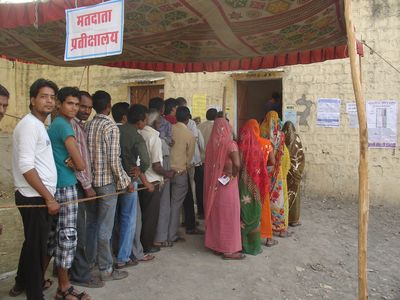 The national event this month were the national elections for the Lok Sabha, which were spread over five weeks. Over 500 million voters had to be given photo id voting slips in advance. Out turn came on the 17th and here you can see the orderly queues at 7.30 am for the one electronic machine. The root of the nail of the index finger on the left hand was inked to prevent re-voting. Our polling station was the boys’ school which consists of a few empty rooms opening on to a beaten earth courtyard. Voting is taken very seriously and thanks to the spread of television and saturation coverage, the personalities involved are more known to the village voter. It is increasingly the case that family members make their own voting choice irrespective of caste, religion or someone else’s say so. The results will be announced on 16th May.
The national event this month were the national elections for the Lok Sabha, which were spread over five weeks. Over 500 million voters had to be given photo id voting slips in advance. Out turn came on the 17th and here you can see the orderly queues at 7.30 am for the one electronic machine. The root of the nail of the index finger on the left hand was inked to prevent re-voting. Our polling station was the boys’ school which consists of a few empty rooms opening on to a beaten earth courtyard. Voting is taken very seriously and thanks to the spread of television and saturation coverage, the personalities involved are more known to the village voter. It is increasingly the case that family members make their own voting choice irrespective of caste, religion or someone else’s say so. The results will be announced on 16th May.
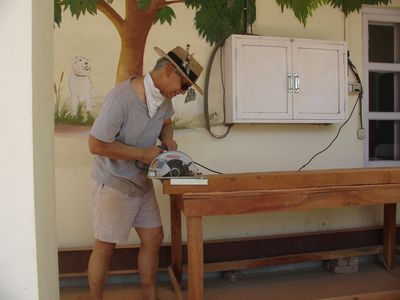 Since we had an empty cottage after Ranjeet’s departure (see last month’s blog), Vijay took the opportunity to repair the sagging porch roof of the cottage. He was able to use his circular saw, and locally made workbench made from home sourced wood to good effect. Some saal wood was bought ready cut from the wood market for use as rafters and purlins and some of our own eucalyptus cut to size in Kaithoon was bolted together to produce sturdy beams of the right length and thickness.
Since we had an empty cottage after Ranjeet’s departure (see last month’s blog), Vijay took the opportunity to repair the sagging porch roof of the cottage. He was able to use his circular saw, and locally made workbench made from home sourced wood to good effect. Some saal wood was bought ready cut from the wood market for use as rafters and purlins and some of our own eucalyptus cut to size in Kaithoon was bolted together to produce sturdy beams of the right length and thickness.
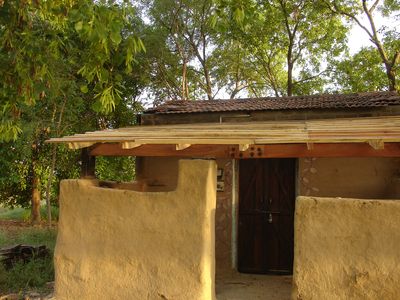 Here you can see the porch under construction. The weight is taken up by stone pillars which had to have their grooves enlarged to support the broader beams.
Here you can see the porch under construction. The weight is taken up by stone pillars which had to have their grooves enlarged to support the broader beams.
Amarlal and family have moved into the renovated cottage. His pay has been increased by 35% from 1st April to Rs.200 per day. This is GBP 2.00 and one year ago would have been GBP 2.60. The fall of the rupee has led to significant increase in the price of imported and oil related goods and thus high inflation. This year, by contrast, the selling price of both mustard and wheat has fallen, squeezing profit margins for the farmers.
On the Farm - March ’14
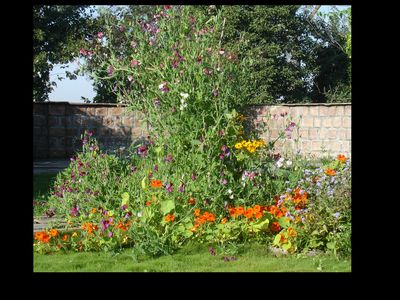 Early March was almost autumnal in feel with misty mornings and falling leaves but it’s the best month for garden flowers. Here is my riot of sweetpeas and nasturtiums.
Early March was almost autumnal in feel with misty mornings and falling leaves but it’s the best month for garden flowers. Here is my riot of sweetpeas and nasturtiums.
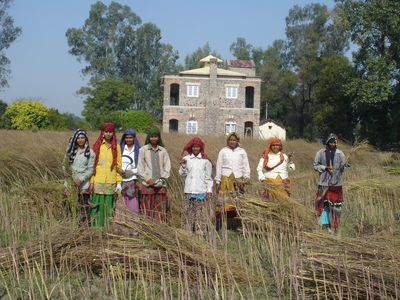
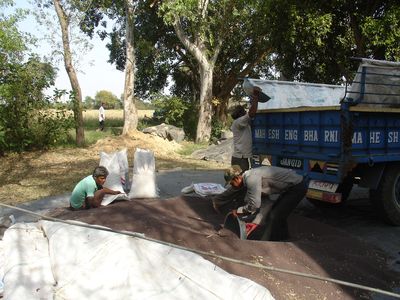
On 5th March eight girls and women came to cut the mustard. Threshing started on the 13th and lasted for four days with a break for the Holi festival. After the trolley was loaded with mustard, it left for the market on the 21st. It fetched Rs. 2931 for 100 kgs. which is 20% less than two years ago and the yield is 25% less, but costs are significantly higher. Interestingly, the price of the chaff has collapsed from Rs.250 per bigha (2.5 bighas make an acre) to Rs.100. A plant had been set up to generate electricity from bio-waste and it created such a demand that the price soared to the point at which it was uneconomic to generate electricity and so the plant closed down.
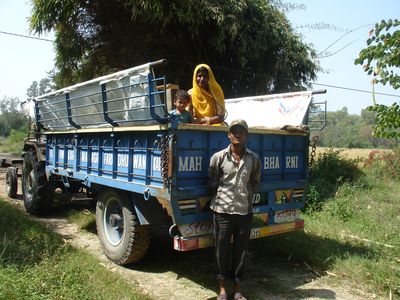 At the end of March we said goodbye to Ranjeet, his wife Asha, and their 20-month old son Ashish who had been born on the farm. Ranjeet has cleared his debts after working for us since September 2011. He is going to live in Kota in a dormitory, and lay steel reinforcements for concrete. His wife and son will stay with his parents in the nearby village. Ranjeet may earn more but he will miss his holistic life on the farm. We wish them a bright future.
At the end of March we said goodbye to Ranjeet, his wife Asha, and their 20-month old son Ashish who had been born on the farm. Ranjeet has cleared his debts after working for us since September 2011. He is going to live in Kota in a dormitory, and lay steel reinforcements for concrete. His wife and son will stay with his parents in the nearby village. Ranjeet may earn more but he will miss his holistic life on the farm. We wish them a bright future.
On the Farm - February ’14
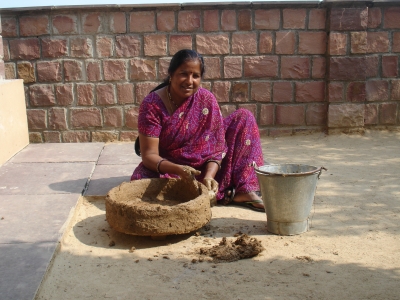 We had normal February weather at first with sunshine and clear blue skies and by the 7th the temperature had reached 31oC. It then began to cool down and we had rain and mist from the 14th onwards. The wheat was being watered, but we stopped when rain came on the 25th.
We had normal February weather at first with sunshine and clear blue skies and by the 7th the temperature had reached 31oC. It then began to cool down and we had rain and mist from the 14th onwards. The wheat was being watered, but we stopped when rain came on the 25th.
Here Sugna is making a clay oven in which to cook ‘battis.’ She left it outdoors to dry and it was destroyed in the heavy rain that night.
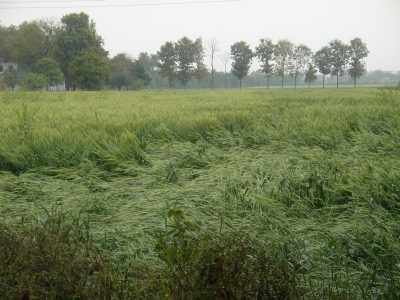 Here is the wheat on the morning after the torrential rain. We were lucky. A large swathe of south-east Rajasthan was bombarded by hail stones, some the size of golf balls. A lot of the standing crops of mustard, coriander and wheat in the path of the downpour were damaged.
Here is the wheat on the morning after the torrential rain. We were lucky. A large swathe of south-east Rajasthan was bombarded by hail stones, some the size of golf balls. A lot of the standing crops of mustard, coriander and wheat in the path of the downpour were damaged.
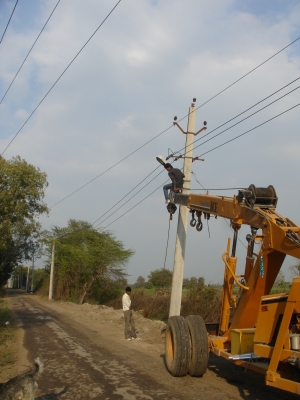 February was the month when we passed from being ‘rural’ to ‘urban,’ as street lights were installed along our lane. The poles had been erected without proper foundational support and after the rain they started leaning - who knows how long they will last?! This photograph depicts the typically carefree attitude towards health and safety.
February was the month when we passed from being ‘rural’ to ‘urban,’ as street lights were installed along our lane. The poles had been erected without proper foundational support and after the rain they started leaning - who knows how long they will last?! This photograph depicts the typically carefree attitude towards health and safety.
On the Farm - January ’14
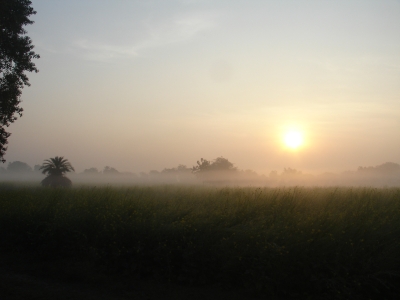 January was exceptionally misty and foggy this year with very little sun. In this photo, a rare morning sun is appearing through the mist over a field of mustard which has finished flowering. The brilliance of the yellow flowers gave way to the intense green of growing wheat as the predominant colour on the farm.
January was exceptionally misty and foggy this year with very little sun. In this photo, a rare morning sun is appearing through the mist over a field of mustard which has finished flowering. The brilliance of the yellow flowers gave way to the intense green of growing wheat as the predominant colour on the farm.
The wheat is usually watered in January, but steady rain did the job and so urea was broadcast on to the wet ground. The front door swelled with the damp and wouldn’t close like it doesn’t in the monsoon.
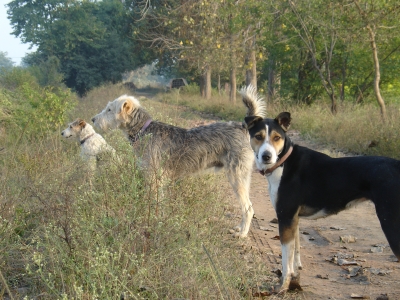 Here, for some light relief, is a picture of our current three dogs alert and on patrol for wild pigs and monkeys, and anything else that moves really. A family of five pigs was spotted along the border one afternoon, but went unnoticed by the three!
Here, for some light relief, is a picture of our current three dogs alert and on patrol for wild pigs and monkeys, and anything else that moves really. A family of five pigs was spotted along the border one afternoon, but went unnoticed by the three!
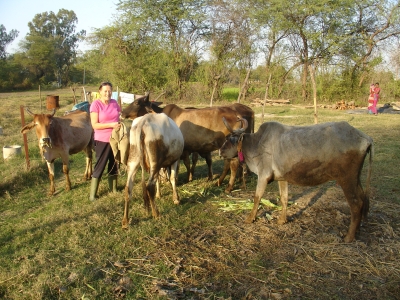 And here is one of me being mobbed by the cows for the outer leaves of the sweet corn I have brought for them. They are penned in all day and the milking cows come out each afternoon to eat piles of green fodder called bersim, and to be milked.
And here is one of me being mobbed by the cows for the outer leaves of the sweet corn I have brought for them. They are penned in all day and the milking cows come out each afternoon to eat piles of green fodder called bersim, and to be milked.
Sadly, one male calf was found dead on 18th January. His mother, Arti, had died in April 2013 and may be he hadn’t been allowed to get to the dry fodder in the communal manger and fell prey to the January cold. The temperature dropped to 4oC on some nights. One explanation for so much localised fog is that after a good and long monsoon, more land is under cultivation than usual and it is all being watered at the same time thus causing very high humidity generally.
On 28th January the sun finally came through in the morning and the land began to dry out. We could get into the vegetable patch and tackle the rampant weeds.
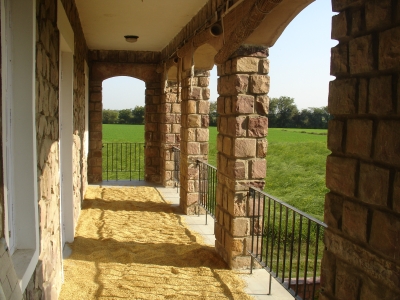 We had been waiting for the dry weather to dry some rice for milling for home consumption. We spread it on the balcony, away from the dogs, for three days. Here you can see the strong shadows cast by the pillars and the railings in the late afternoon. In the background is rather bent heavily laden mustard with wheat in the distance. Perfect weather.
We had been waiting for the dry weather to dry some rice for milling for home consumption. We spread it on the balcony, away from the dogs, for three days. Here you can see the strong shadows cast by the pillars and the railings in the late afternoon. In the background is rather bent heavily laden mustard with wheat in the distance. Perfect weather.
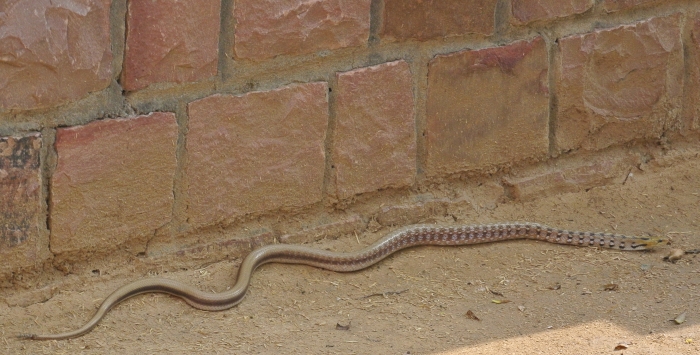 This common trinket snake made a sudden unannounced appearance in our garden. This snake is non-poisonous, but reputed to bite viciously and repeatedly if provoked. We didn’t try and find out! It climbed one of the shrub trees in the garden and we left it alone to go about its business unharmed.
This common trinket snake made a sudden unannounced appearance in our garden. This snake is non-poisonous, but reputed to bite viciously and repeatedly if provoked. We didn’t try and find out! It climbed one of the shrub trees in the garden and we left it alone to go about its business unharmed.

